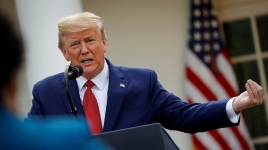Trump to push for reopening economy despite coronavirus testing concerns
Thursday, April 16, 2020
WASHINGTON (Reuters) - President Donald Trump on Thursday is expected to lay out a strategy to phase out the month-long economic shutdown aimed at stanching the coronavirus pandemic, despite concerns from health experts, state governors and business leaders about the dangers of lifting restrictions without widespread testing in place.
Trump will push states to lift stay-at-home orders that have shut down business and social life as the number of deaths recorded in the United States on Wednesday rose by 2,500, a second consecutive daily record. The U.S. death toll in the global pandemic is now more than 31,000, higher than any other nation.
The state restrictions have strangled the U.S. economy to an extent not seen since the Great Depression nearly a century ago. Another 5.2 million more Americans sought unemployment benefits last week, the Labor Department reported on Thursday, lifting total filings for claims over the past month to more than 20million.
The Republican president, who has staked his re-election in November on the strength of the U.S. economy, is scheduled to hold a call with the nation’s governors at 3 p.m. (1900 GMT) and said he would announce his plan at a news conference later on Thursday. The White House coronavirus task force is scheduled to hold its daily public briefing at 5 p.m. (2100 GMT).
As the debate over the right time to reopen the economy raged, New York City Mayor Bill de Blasio appealed to Washington to provide the “basics” such as health, housing and food for everyday Americans in epicenters like New York City.
“Everyone wants our economy to recover, I know everyone in Washington feels that too,” de Blasio said. “But there has to be a clear understanding if we can’t provide the basics for our people you can kiss your recovery goodbye.”
On Wednesday, Trump said data suggested new cases have peaked and that industry leaders in a round of calls offered him good insights into how to safely restart the economy.
But public health experts and business leaders say that comprehensive testing for the coronavirus is a prerequisite for abandoning stay-at-home orders and other social distancing measures to ensure there is no resurgence of infections and in order for people to feel safe.
“The worst thing that could happen would be for us to throw everyone back into the economic cycle and have to go back to having 97% of our people being told to stay home again,” Trump’s former White House chief economic adviser Gary Cohn told CBS News on Thursday.
The total number of cases nationwide rose nearly 30,000 on Wednesday to 637,000, the biggest increase in five days. But not all states have been struck equally.
Eighteen states have recorded fewer than 100 deaths from COVID-19, the disease caused by the coronavirus. On Wednesday, Centers for Disease Control and Prevention Director Robert Redfield said 19 to 20 states had indicated they could be ready to open as soon as May 1, without naming the states.
North Dakota’s Doug Burgum is the only state governor so far to issue his own guidelines for reopening as soon as May 1.
Even within states, urban areas have been hit harder than rural areas. That divide has inflamed political divisions and prompted protests against some state leaders who opted to keep residents at home.
In Michigan, thousands of demonstrators in cars with horns honking thronged around the state capital on Wednesday, some chanting “Lock her up,” to protest against stay-at-home orders imposed by Governor Gretchen Whitmer.
Traffic around the statehouse in Lansing was jammed for hours by the rally, dubbed “Operation Gridlock” and organized by the Republican-aligned Michigan Conservative Coalition.
Michigan has faced one of the country’s fastest-growing infection rates for the new coronavirus, with more than 27,000 confirmed cases and nearly 1,800 deaths.
Earlier this week, Trump said he had the power to override state governors who did not move to restart activity, before later saying he would work with them on their efforts to reopen.
U.S. medical companies and labs have been rushing to expand testing supplies and options, not only to diagnose the virus but also to screen for possible immunity.
Months into the coronavirus crisis, however, diagnostic tests in the United States are still hard to come by. Capacity to process the tests is also an issue, especially if employers move to more widespread use.
Other companies are developing quick blood tests for antibodies that could indicate immunity and allow workers to return, although researchers said many questions remain.
Even when activity starts again, health experts have said the country will be vastly different, with face masks and continued social distancing the new normal.
https://uk.reuters.com/article/uk-health-coronavirus-usa/seven-u-s-states-extend-coronavirus-shutdown-to-may-15-as-trump-prepares-to-map-out-plan-idUKKCN21Y1X1





